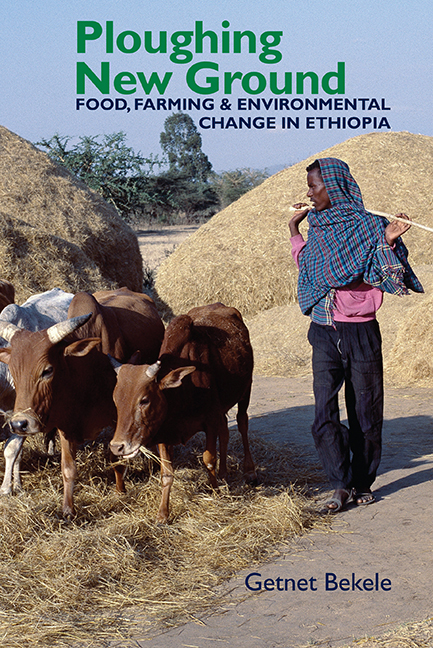Book contents
- Frontmatter
- Dedication
- Contents
- List of Maps and Tables
- Acknowledgements
- Note on Orthography
- Acronyms & Abbreviations
- Glossary
- Map
- Introduction
- 1 Landscape Pastoral: The making and remaking of a grassland environment, 1886–1916
- 2 Negotiating a Landscape: Continuity and change in a grassland environment, 1917–1941
- 3 Blurring the Boundaries: The ascendancy of crop production in a flexible environment, 1942–1955
- 4 Fresh Encounters and Morphing Strategies: The changing organization of production in an era of agricultural intervention, 1956–1965
- 5 Inputs, Outputs and the Farm: Transformations in the science, politics and praxis of agricultural development, 1966–1974
- 6 Competition and Co–existence: Creating space for small- to large-scale farming, 1966-1974
- 7 Of Production and Production Relations: Farming in an era of revolutionary change and socialist development, 1975–1991
- 8 Vicious Circle: Agricultural development at the time of ‘revolutionary democracy’, 1991–2016
- Conclusion
- Bibliography
- Index
- Eastern African Studies
8 - Vicious Circle: Agricultural development at the time of ‘revolutionary democracy’, 1991–2016
Published online by Cambridge University Press: 31 August 2018
- Frontmatter
- Dedication
- Contents
- List of Maps and Tables
- Acknowledgements
- Note on Orthography
- Acronyms & Abbreviations
- Glossary
- Map
- Introduction
- 1 Landscape Pastoral: The making and remaking of a grassland environment, 1886–1916
- 2 Negotiating a Landscape: Continuity and change in a grassland environment, 1917–1941
- 3 Blurring the Boundaries: The ascendancy of crop production in a flexible environment, 1942–1955
- 4 Fresh Encounters and Morphing Strategies: The changing organization of production in an era of agricultural intervention, 1956–1965
- 5 Inputs, Outputs and the Farm: Transformations in the science, politics and praxis of agricultural development, 1966–1974
- 6 Competition and Co–existence: Creating space for small- to large-scale farming, 1966-1974
- 7 Of Production and Production Relations: Farming in an era of revolutionary change and socialist development, 1975–1991
- 8 Vicious Circle: Agricultural development at the time of ‘revolutionary democracy’, 1991–2016
- Conclusion
- Bibliography
- Index
- Eastern African Studies
Summary
In Ethiopia the more things change the more they look the same. This was particularly true in regard to the politics of agricultural development and the rules and regulations governing access to farming land, which continued to evolve along previously existing lines after the demise of the Derg and the rise to power of the Ethiopian Peoples’ Revolutionary Democratic Front (EPRDF) in May 1991. Like its predecessor, EPRDF was unrelenting in its efforts to renew and consolidate the state's grip on agricultural land and farming populations. Likewise, EPRDF's interest in making agricultural development a state monopoly and an avowedly techno-scientific enterprise had its origins in the previous half century. While these continuities are important, the period after May 1991 witnessed also the grafting of new rules and practices that had farreaching implications in the way farming populations organized places, production and exchange at the local level. For example, the impact that the renewed liberalization of the food market and the growing availability of modern inputs and extension services have had on the evolution of Ethiopia's smallholder agriculture in the last two decades and a half has been considerable. A relatively new development in Ethiopia after 2005 pertained to the expansion of medium- to large-scale commercial farming on a hitherto unprecedented scale. This chapter situates these developments in the social space of the lake region, so as to understand the relatively new direction that agrarian politics, together with agricultural and environmental change and transformation, have taken in Ethiopia since May 1991.
OLD IDEAS, NEW TIMES
If revolutions are products of ideas, the ideas that produced Ethiopia's second revolution in May 1991, also had their origin in the student movement of the 1960s and early 1970s. In addition, this revolution, like the one that preceded it, was led by a group of politicians that had subscribed to the teachings of Marx, Lenin and Mao at some point in their relatively long political careers. Specifically, the influence that the writings and deeds of the noted Albanian communist leader Enver Hoxha had on the shaping of some of the ideas and policies of EPRDF's long-time leader the late Meles Zenawi (r. 1991-2012) was profound. Furthermore, Meles seems to have tapped into the literature that Italian colonial officials and intellectuals had produced on Ethiopia and the Horn of Africa over half a century before.
- Type
- Chapter
- Information
- Ploughing New GroundFood, Farming & Environmental Change in Ethiopia, pp. 159 - 173Publisher: Boydell & BrewerPrint publication year: 2017

